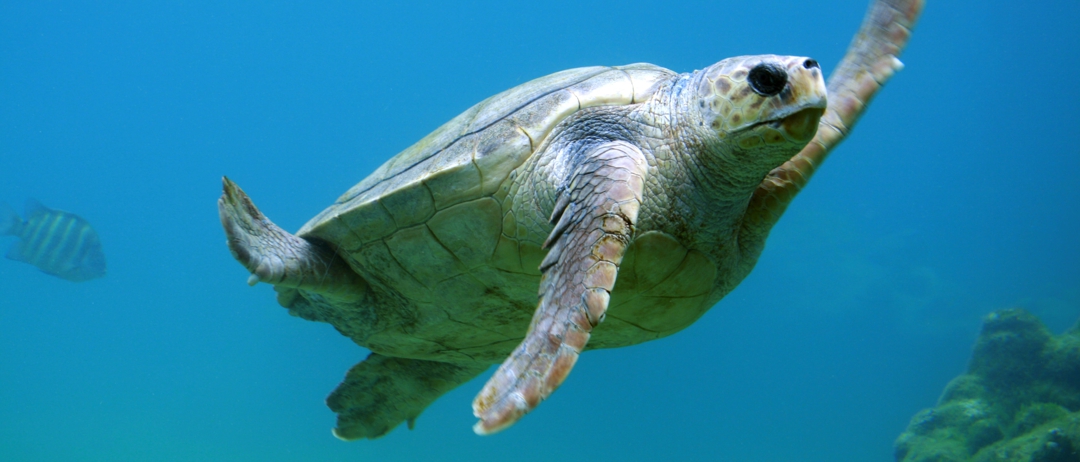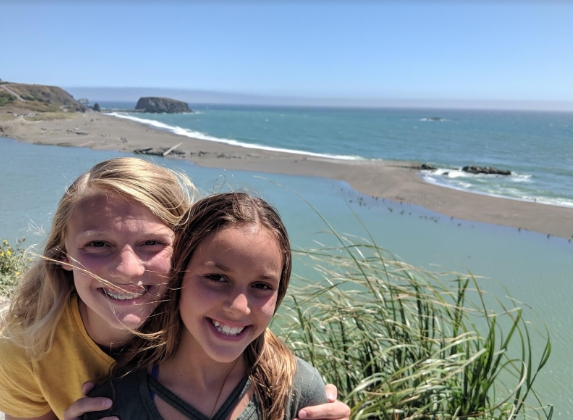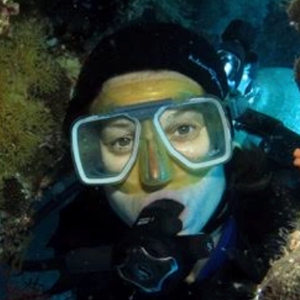
Where Even the Mountains Swim
I have no distinct memory of falling in love with the outdoors, I just remember always playing outside. I was fortunate to live near a riparian area in the Sonoran Desert, where my brothers and I would explore and build forts literally every day, regardless of the Arizona heat. My love for the outdoors grew into a broader love for adventure. When I was 16 I went to a local dive shop and earned my Scuba certification. Scuba diving opened up a whole new world for me. I got to travel and explore nature at a level I could never have imagined. Creatures underwater didn’t scurry away and hide. Close encounters with manta rays and sea turtles gave my lost teenage soul a grounded sense of purpose and deepened my connection with nature. As a biology undergrad at the University of Arizona, I took a summer research class that traveled down the coast of Baja, California. I distinctly remember a bumper sticker on a truck in a small coastal town on the Sea of Cortez that said, “Welcome to Loreto, where even the mountains swim.” I remember taking notice of desert hills covered with massive cardón cactus plunging into crystal clear turquoise water and feeling fortunate not just to be there, but to be alive, alive on THIS planet. I remember feeling in awe of what I got to experience in that place and realized, in turn, what I get to experience, also has to experience me. My adolescent mind immediately spun with feeling like an intruder. How was I a part of this majestic place and why should I deserve to be there?
Making Choices Count
Around the same time I learned to dive, there was great controversy surrounding the tuna fishing industry and its brutal fishing tactics resulting in what could only be described as mass dolphin massacres. For years, the fishing industry had gotten away with this practice because the consumer had no idea. When the public was made aware, consumers were outraged. I can even remember a line in one of the Lethal Weapon movies where the teenage daughter of Donald Glover’s character spoke out against the tuna industry. I remember being so excited that an actual environmental cause got a soundbite in a major Hollywood film. I was a teenage girl feeling exactly the same way as that character. People stopped buying tuna, so fisheries responded with “dolphin safe” tuna. I was not even old enough to vote, but my choice to boycott tuna contributed to a larger, global boycott that resulted in entire companies changing their practices. It made me realize that MY choices could help shift industry practices that impacted the environment. To this day, environmental issues from overfishing to skipping the plastic bags in the grocery store still influence how I spend my money.
My own children have found their own initiative as young consumers. When they were elementary students, they were introduced to an environmental organization called One More Generation (OMG). OMG was started by two young school children, Carter and Olivia Ries, from Atlanta, Georgia, who had concern about animals that could potentially go extinct within “one more generation.” Through this organization, my children learned about habitat destruction in Borneo threatening orangutans. Ironically, this environmental issue has been initiated by a different consumer campaign. When consumers became aware of the health risks associated with partially-hydrogenated vegetable oil, palm oil was found to be an ideal replacement. As the food industry has been reducing its use of partially-hydrogenated vegetable oil, the demand for palm oil is sky-rocketing, and tropical regions from Asia to Africa are rapidly deforesting to meet this demand. My children wondered then, how much of what we eat and use requires palm oil? Is it something we can give up until there is a way for products to indicate whether their palm oil was harvested from a more sustainable source?
After we looked into it, my kids were disappointed to learn that most of what requires palm oil is the fun, yummy processed food. They realized that some of their favorite snacks were made possible due to palm oil, but my determined and youngest daughter, Molly, insisted we make a change. They learned how to read labels on food packaging and the best outcome, aside from their initiative to be responsible consumers, we eat so much healthier! We have all but eliminated processed food (and all the packaging that comes with it) in the house. I rarely have to say “no” to things in the grocery store. When they ask for junk food, I simply say, “Does it have palm oil?” It usually does… So we eat healthier while contributing to what we hope will one day be a larger consumer campaign to reduce deforestation by demanding sustainably harvested palm oil.
Message from My Daughter, Makena (age 14)
 Earth is the only planet that we know supports life. It has the perfect blend of elements creating a balance of organisms that make up nature. That is part of what is so amazing about our home, our only home. It’s unique to us, but we rarely take time to appreciate it, let alone think about our impact on it. This is why it’s important to me to consider what I take from the Earth for the purpose of my everyday life. How do my choices impact the balance? Am I taking more than what I’m giving back? For all that the Earth provides for me, how can I reduce harm to the very thing that gives me life?
Earth is the only planet that we know supports life. It has the perfect blend of elements creating a balance of organisms that make up nature. That is part of what is so amazing about our home, our only home. It’s unique to us, but we rarely take time to appreciate it, let alone think about our impact on it. This is why it’s important to me to consider what I take from the Earth for the purpose of my everyday life. How do my choices impact the balance? Am I taking more than what I’m giving back? For all that the Earth provides for me, how can I reduce harm to the very thing that gives me life?
In the world today is it so hard to be a conscientious consumer, with almost all products causing enormous carbon footprints, deforestation, and many more environmental hazards, with little to no company acknowledgement of their unsustainable business methods? The few items that are sustainable are usually expensive and hard to find. In contrast, today we also have the power to change those policies. By contacting congress members, taking time to research, and cutting out products unsustainably sourced, we can use our voices and be the change the environment needs. You may think that none of this would make a difference or that it’s too much work, but time is running out for our environment and we need to go the extra mile for it, as it has done for us. What we’re doing right now is not enough, and more resources need to be put into solving this problem. The fate of the world literally depends on what action we take now. Do you want to be the people [generation] who destroyed a planet?
 Trish is a high school science teacher in Tucson, Arizona. When she isn’t diving to the great depths of the ocean, she is a mom to 2 rockstar young women and a wife to her dynamo husband, Paul. Plus, she makes a mean margarita.
Trish is a high school science teacher in Tucson, Arizona. When she isn’t diving to the great depths of the ocean, she is a mom to 2 rockstar young women and a wife to her dynamo husband, Paul. Plus, she makes a mean margarita.